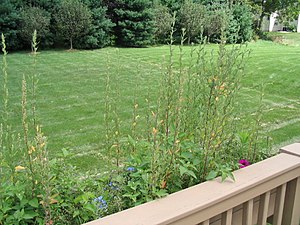It’s that time of year everywhere. Here in the “almost” south of Raleigh, NC, I have been cutting my grass again for a while now. As the rest of the country (you Yanks) heads full swing into the competitive world of neighborhood lawn care I started to think about the different types of lawns there are and how no two are alike. While similar in that they are green and are right around a house, they are very different in their care and their ultimate appearance. Whether we like this or not, they also make a statement about the owner. A sloppy yard is assumed to be kept by a sloppy person. Internet marketing works in a very similar fashion. Here’s what I mean.

Image via Wikipedia
Think of any industry or vertical and the various Web sites that can be found when searching for a product. I’m not going to pick a specific industry because this idea works across all of them. No matter how hard you look, it is safe to say that most Web sites in any vertical will be described by a type of lawn and the associated image that is cast on the owner of that lawn or Web site, whether it is deserved or not.
- The mile high lawn. This lawn gets cut only when the grass reaches a minimum height of 8 inches. The Web site equivalent of this is a business that built a Web site using Front Page at the turn of the century and has pretty much let it go. Like the yard owner, they may cut it if it bugs them enough or a neighbor complains to the homeowner’s association, but it is done reluctantly. Web sites like this are antiquated with spinning globes and frames which are ugly and tell the visitor that you don’t really care about this. Search engines hate this kind of site and the businesses they represent.
- The “close enough for government work” lawn. This lawn is regularly cut, but is not given any other attention whatsoever. Trimming is sometimes done and sometimes not. A similar Web site is one that looks OK but hasn’t been updated in a while. It may look OK, but the care and maintenance are an indication that it’s not in great shape and may not be around next year. Search engines tolerate this kind of site but do not reward them.
- The DIY lawn. This is the lawn that a homeowner slaves over, working himself to the bone. He the ultimate man’s man–a true do-it-yourselfer. Since he is not a lawn maintenance professional, he can get the lawn to an almost pristine condition but there are a few trouble spots. Web sites like this are generally very nice looking and informative, but they lack some of the finer points that really put it over the top. Search engines view these kind of sites as the best of the rest and if there is no other better lawn in the neighborhood they may win a contest or two.
- The Professional Lawn. This is the lawn that looks like a painting. It is lush and green. The owner never touches it other than to play with the family on it or to adjust a sprinkler head. While the DIY lawn guy is out busting his hump next door, the Professional lawn owner leaves it to the pros to treat and manicure the lawn to perfection. He is able to enjoy looking at the lawn, devoting his valuable time to other matters that carry more impact. Sure, he pays for it, but he does it because he has measured the ROLI (return on lawn investment). Web sites like these are often rewarded with top placement in the search engines. More importantly, they tell the visitor that the owner is very put together and cares about his business. His Web site makes you wonder why he is so successful and how you can do business with or through him. It’s appealing and attractive. His lawn converts and so does his Web site.
So what condition is your lawn in? If it is a mile-high special, will you be able to turn it into a Professional in one season? Not likely. Same goes for bad Web sites. If you are looking to join the ranks of the elite, you better hire a pro, be ready to invest time and money, and then know that your investment will come back in increased business and profits.
Be the best site in your neighborhood. When you see how people treat you, you’ll wonder why you didn’t do this sooner.

![Reblog this post [with Zemanta]](http://img.zemanta.com/reblog_e.png?x-id=f73198ed-b2e3-41e3-8d99-c2bd61e2ba9d)





